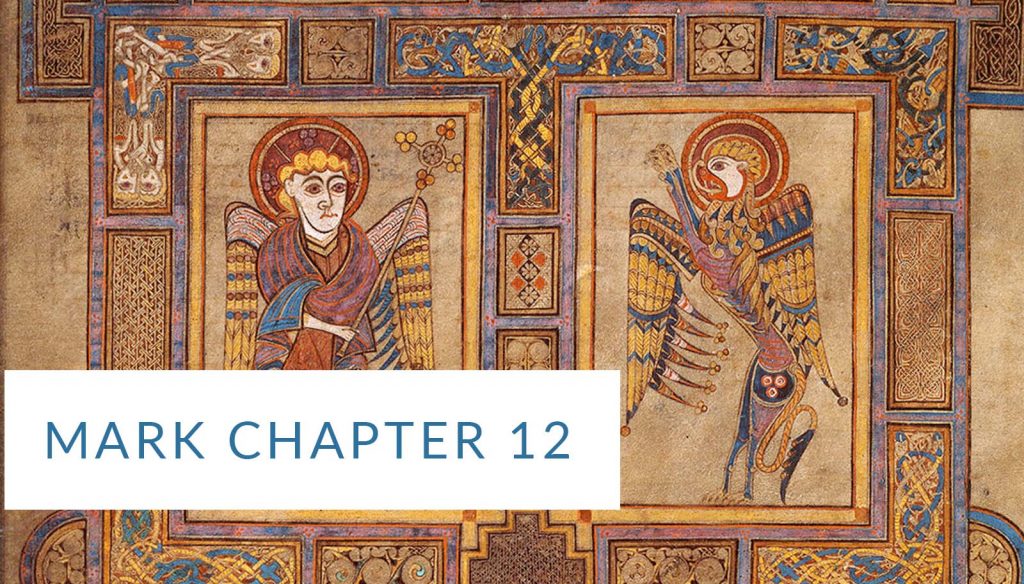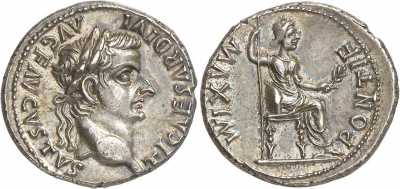This week’s readings are all from Mark chapter 12. Click here to see a full listing of each day’s reading and the full chapter of Mark 12. Full readings of each day’s smaller segments of the readings will be posted on this site during the week.
Today's Reading
Now they wanted to arrest him (but they feared the crowd), because they realized that he told this parable against them. So they left him and went away.
13 Then they sent some of the Pharisees and Herodians to trap him with his own words. 14 When they came they said to him, “Teacher, we know that you are truthful and do not court anyone’s favor, because you show no partiality but teach the way of God in accordance with the truth. Is it right to pay taxes to Caesar or not? Should we pay or shouldn’t we?” 15 But he saw through their hypocrisy and said to them, “Why are you testing me? Bring me a denarius and let me look at it.” 16 So they brought one, and he said to them, “Whose image is this, and whose inscription?” They replied, “Caesar’s.” 17 Then Jesus said to them, “Give to Caesar the things that are Caesar’s, and to God the things that are God’s.” And they were utterly amazed at him. (Mark 12:12-17)
Parallel Passages in Other Gospels
The teachers of the law strike me as our current day FBI. Following Jesus and trying to catch him in something they could charge him. Convinced of Jesus guilt..of what? Daring to question their authority and speaking truth. Aware that even today we don't like to hear words that contrast our thinking and biases. Certainly we see holding on to power as a motive for all sorts of misguided actions in our own lives and in our world. Jesus knew the consequences of speaking these truths. He did it anyway. Asking myself am I speaking the truth boldly.
The common denarius in the Roman Empire during this period was the Tiberian denarius. This coin had the image of Tiberias Caesar on one side and the image of a woman on the other, who is often understood to be Tiberias' mother Livia depicted as Pax (Peace). The writing on the coin was "TI[berivs] CAESAR DIV AVG[vsti] F[ilivs] AVGVTVS", "Tiberias Caesar Son of the Divine August/Revered Augustus" on the side with Tiberius' image and PONTIF[ex] MAXIM[imus], "High Priest" on the other. Here is a visual of this coin (click to enlarge):
There were other Roman coins bearing the image of a Caesar that could have also been the coin in this story, coins that bore the images of either Julius Caesar or his adopted son Caesar Augustus. All these coins bore titles declaring the emperors to be "DIVI FILI," "Divine Son."
Here is a great video of an Augustan Denarius (so you can see the size). The front is Augustus' image and name with the DIVI F[ili] clearly seen. The reverse is a bull with "IMP X", which stood for "Imperator Decimum," commemorating his legions' victory in Pannonia.
The question of paying taxes (literally, the kēnson, "census tax") was a dangerous one. Rebellions and uprisings against Rome had happened based upon the implementation, high rates, and extortion practices related to taxes. In 6 CE Judas the Galilean led such a revolt during the census of Quirinius, refusing to pay the taxes upon pain of death and declaring that Israel had no God but YHWH alone (see Josephus Antiquities of the Jews 18.2-8, 23–25; see also Acts 5:37). This violent zealot movement continued from 6 CE through the First Jewish Revolt with the destruction of the Temple and lastly Masada, and his sons and grandsons were part of this movement and were all killed by the Romans.
Catching a Galilean, hailed as the messianic "Son of David" just days earlier, making a statement against paying the census tax would be an effective way of setting him up to die at the hands of the Romans. Luke captures this reality more fully than Mark, when Jesus is finally delivered to Pilate:
Then the whole group of them rose up and brought Jesus before Pilate. They began to accuse him, saying, “We found this man subverting our nation, forbidding us to pay the tribute tax to Caesar and claiming that he himself is Christ, a king.” So Pilate asked Jesus, “Are you the king of the Jews?” He replied, “You say so.” Then Pilate said to the chief priests and the crowds, “I find no basis for an accusation against this man.” But they persisted in saying, “He incites the people by teaching throughout all Judea. It started in Galilee and ended up here!” (Luke 23.1–5 NET)

